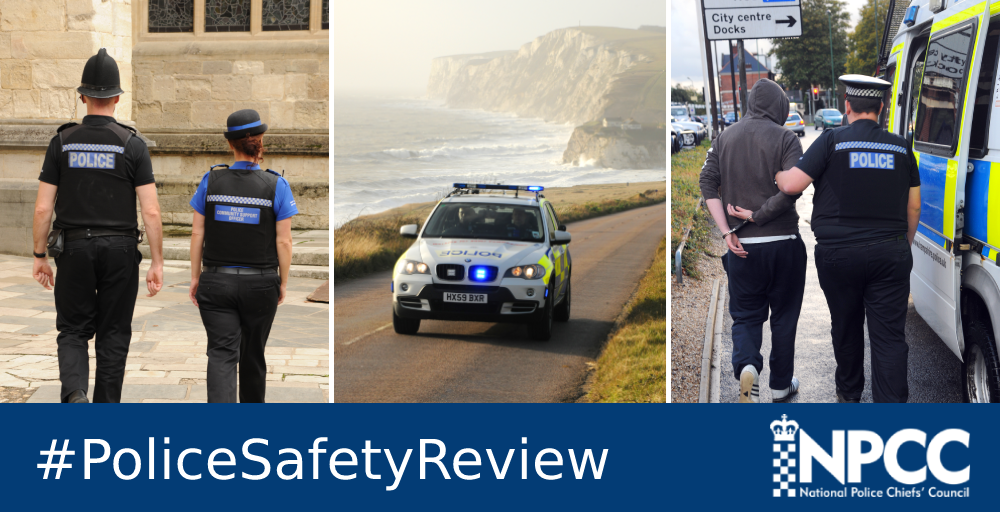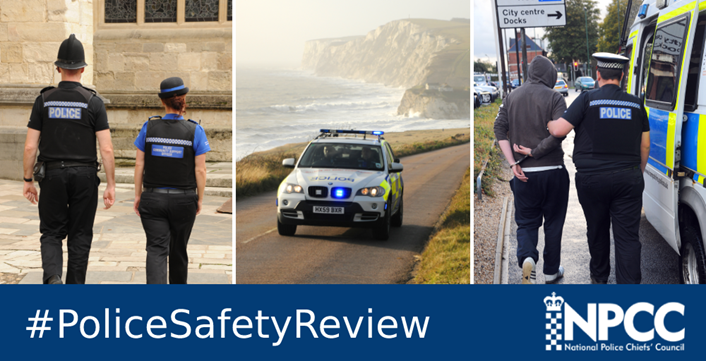
02 Sep 2020
NPCC and College of Policing pledge to improve officer and staff safety following largest ever survey of police workforce
Officer safety training to be overhauled and every police chief to review the equipment available to the frontline, following the findings of a review and safety survey commissioned by the NPCC and College of Policing last year.
A full-scale review of officer and staff safety has been completed, informed by the views of over 40,000 officers and staff in a national safety survey conducted by the College of Policing. The review was commissioned in response to concerns about rising assaults and increased violence against officers.
In September 2019, NPCC Chair Martin Hewitt commissioned a team of police officers and staff to work with the College of Policing to gather professional expertise, review available evidence and make recommendations to improve officer and staff safety. All 28 recommendations were unanimously agreed by Chief Constables’ Council in January 2020.
Publication of this report was delayed due to the Covid-19 pandemic, which has also highlighted issues of safety for frontline officers and staff. Work has been underway since then to begin implementing the recommendations of this review and improve safety of officers and staff.
|
Findings from the Officer and Staff Safety Review and National Police Safety Survey Figures from 2008 to 2019
Figures from 2018/19
Survey findings:
|
Provisional figures released by the NPCC throughout the pandemic show a continuing trend of increased assaults against emergency service workers. In the most recent figures released, taking a snapshot of crime for the four weeks to the 2 August 2020, and comparing it to the same four week period in 2019, forces saw a 31 per cent increase in assaults against emergency workers. It is thought the rise may be driven by increases in common assaults on police constables, including suspects spitting on officers while claiming to be infected with Covid-19.
National Police Chiefs’ Council Chair Martin Hewitt said:
“In this Review, we have followed the evidence, listened to the concerns of those within the service, and heard the views of the public.
“The Review and the breadth of its recommendations show that there is no one piece of equipment that is the answer to all violent and threatening situations. Instead, chief constables have agreed a broad package of measures that will significantly enhance the safety of our brave and hardworking frontline.
“We’re overhauling safety training, trialling new technology and tactics, reviewing the availability of equipment and taking a hard line on the standard of response after an assault. Chiefs have also agreed to take suggestions for legislative change to government to further protect officers and staff.
“The primary purpose of the police service is to keep the public safe. Having well trained and equipped officers and staff allows us to fulfil that purpose as well as our responsibility to do all we can to protect our people.
“Policing is a career with huge rewards but front line police officers and staff join knowing they face some risks and will sometimes have to run towards danger. Those risks can never be eliminated completely but, as these changes are implemented, we do expect to see a reduction in the number of assaults and greater satisfaction in the response after an assault.”
The package of agreed measures agreed includes:
- The College of Policing overhauling current safety training and replacing it with a new national curriculum, including recommended contact time with trainers, which all chief constables in England and Wales have committed to ensuring is met. Current provision of personal safety training was found to be inconsistent with officers in some forces receiving 16 hours of annual training compared with four in others.
- Introducing an improved process for decision-making about deployment, equipment and other operational issues. A national framework for conducting a strategic threat and risk assessment will be created to ensure consistency of approach across police forces, even if local circumstances mean different decisions about equipment and deployment.
- Every chief constable reviewing whether their frontline officers and staff have the equipment they need and increasing the availability of Taser, body armour, spit and bite guards, protective gloves and high-visibility clothing to proportionate levels if supported by their strategic threat and risk assessments. The Review has maintained the position that these decisions must be taken by chief constables based on local circumstances.
- Research to examine racial disparities in the police use of Taser. In England and Wales, national use-of-force data has shown that people perceived to be black or black British were involved in a higher of proportion of incidents where less lethal weapons (principally Tasers) were drawn compared to people perceived to be white. Research has been commissioned to address the current evidence gap in understanding the causes of the disparity and to make recommendations to minimise it.
- Expediting trials of new technology or equipment that could enhance safety such as changes to prevent assaults in police vehicles and remotely operated vehicle immobilisation devices.
- A hard line approach to investigations into officer assaults with arrest of an offender the default position. This will be supported by work to set out the standards police victims of assault should expect at each stage of the criminal justice process and a review of impact of the Assaults on Emergency Workers (Offences) Act 2018 on the outcomes for those assaulted.
National Police Chiefs’ Council Lead for Officer and Staff Safety, Chief Constable Alan Pughsley said:
“It is never acceptable for anyone to be assaulted or harmed just for turning up to do their job. We’re concerned by the rising numbers of assaults against officers and staff and have worked to make sure this review can quickly deliver improvements for them.
“Work to implement the recommendations of the review has begun at pace, even throughout the current pandemic. With the support of government, chiefs and staff associations, we have the commitments in place to make a positive difference for everyone within policing.
“The views and experiences of over 40,000 officers and staff have helped shape this review and its recommendations. We will seek to repeat the national safety survey and test the views of officers and staff again as recommendations are implemented.”
College of Policing CEO, Chief Constable Mike Cunningham said:
“Police officers and staff in England and Wales are paying a heavy price for keeping people safe, with many reporting that their health is suffering as a result. The number of assaults on police officers has risen over the past five years, with more than 30,000 assaults on police officers recorded in 2018/19.
“It is essential that we reduce the risk of officers and staff getting injured or suffering harm when at work and police leaders across the service are collectively taking a stand today. The College of Policing undertook a national safety survey, likely to be the largest ever carried out in the police service, to hear directly from those on the frontline. More than 40,000 officers and staff responded to us and the stark findings include 71,308 sickness absence days as a result of assaults in one 12-month period. A conservative estimate of the direct cost to the public of days lost to assault is £4.7 million. The full social and economic costs, including the criminal justice processes and health costs will be far higher.
“We are taking action to make sure officers and staff who come to work each day to protect the public are better protected themselves.”
The College of Policing has also today published new guidance for forces and officers on approaches that can be taken to attempt to resolve confrontations with the public without the need to use force.
The guidelines help to address a key finding in the National Police Safety Survey. Officers were asked which tactics they used regularly that may have been taught during personal safety training (PST). A total of 91 per cent said they were most likely to use non-physical conflict management skills on a regular basis rather than physical skills. However, a quarter (26%) said that not enough time was spent training essential communication and only half (52%) said their training had taught them how to defuse confrontation.
The updated guidelines, developed using evidence from frontline officers including techniques developed for hostage negotiation, address this issue and provide support for officers in practicing de-escalation, communication and negotiation skills in order to avoid the use of force wherever possible.
Home Secretary, Priti Patel said:
“It is without doubt that our brave police do one of the most difficult jobs out there, putting their lives on the line and confronting violent situations every day to keep the public safe.
“The increase in assaults on these brave men and women is simply unacceptable, which is why the Government is consulting on doubling the maximum sentence for this crime.
“I welcome this vital work from the NPCC which shows it is essential that police are equipped with the right protection, training and tools to protect the public and themselves.”
Police Federation of England and Wales, National Vice-Chair Ché Donald said:
“The safety and well-being of police officers is absolutely paramount. Policing is unpredictable and often dangerous, so it is only right that officers have the very best equipment, training, and support for the extraordinary job they do, and we made this crystal clear in our feedback during the review.
“There are many good points raised in this review and chief officers must now take action to implement them so that they make a tangible difference and are felt on the ground by our hard-working officers.”
Police Superintendents’ Association President, Chief Superintendent Paul Griffiths said:
“This review has given our service a greater understanding of the challenges facing our workforce, and the systems we have in place to support and protect our people. It’s extremely positive so see so many proactive recommendations coming through, which when implemented, will make lasting improvements on their working lives.
“We have a duty and a responsibility to equip our officers and staff with a range of tools to help them protect themselves and the public, enabling them to manage incidents with confidence. They need access to equipment and technology, but we must also look at how we provide training in skills such as tactical verbal communication to help them resolve situations without the need for force.
“This comprehensive, holistic approach to protecting our people must be consistent. Every officer and every member of staff, at every rank, should have access to the same high standard of training and equipment, wherever they are based, and a standardised, national approach will ensure this happens.
“Alongside this, we need to continue to protect and build our relationship with the public to ensure it remains at the heart of our policing values. We need to understand why tension exists, how we can better respond to community issues and how we can ensure that people view us with the respect and trust we strive for.”
Ben Priestley, UNISON National Officer (Police and Justice Service Group) said:
“UNISON is happy to contribute and promote initiatives that improve the safety of police staff.”
Notes to editors:
The full report can be read here.
The new College of Policing guidance on conflict management can be found here. The findings can be found here.
The findings of the National Safety Survey can be found here.
A research report on Use of Force produced by the College of Policing can be accessed here (this relates to findings expressed in Chapter 2 of the OSSR).
The Review team were tasked with:
- assessing current safety arrangements and their impact on police legitimacy and public confidence;
- assessing the suitability and distribution of the equipment issued to officers and staff;
- understanding the breadth of training currently offered to officers and staff for their safety;
- understanding the suitability of the existing welfare support provision in place for officers and staff;
- understanding the reality around the criminal justice outcomes that follow an assault.
The College of Policing survey was sent out to every member of the police service registered for online learning, and more than 40,000 responses concerning safety and wellbeing were received. It is believed to be the largest ever survey to have been carried out in policing, in England and Wales with 20 per cent of all police officers and over 25 per cent of all PCSOs submitting responses.
Further measures agreed include:
- Action to address the hidden risks officers face on the roads, both on and off duty, regardless of where the risk comes from. Of the officers and staff killed on duty between 2008-2019, 53 per cent were killed in a road traffic collision and the majority of those were commuting to or from work. All forces will now adopt common minimum safety standards and consider peer-to-peer support from roads policing specialists. A new learning package will be developed and research commissioned into the links between shift work and road accidents.
- Calls on the Government to fill legislative gaps so more forms of attack on officers are treated as crimes. Police chiefs are discussing with government:
- a new offence for deliberately using, threatening or attempting to use a vehicle to target a police employee;
- and amendment to the Assaults on Emergency Workers (Offences) Act 2018 so that spitting and hate offences against emergency workers are treated as aggravated offences.
- A commitment to officers and staff of the minimum standard of support and communication should expect if they suffer an assault. Just over half of officers and PCSOs were satisfied with support they received from supervisors following a recent assault. So chief constables will ensure welfare responsibilities are properly understood and supervisors are supported in their important roles.
Contact information
Communications office
By phone: 0800 538 5058
By email: press.office@npcc.police.uk






